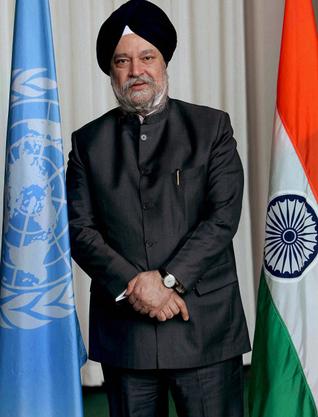
“We strongly believe in the peaceful handling of any conflict situation in accordance with the applicable legal principles by avoiding any unauthorized intervention in a State’s internal affairs,” India’s Permanent Representative to the UN Hardeep Singh Puri said.
Mr. Puri, speaking at a UN high-level meeting on the ‘Rule of Law at the National and International levels’ during the 67th session of the General Assembly here, said peaceful settlement of disputes is the key factor in maintenance of international peace and security and in the promotion of rule of law.
“We believe that the rule of law is essential for and central to all,” he said, adding the law making activity at the national level is exclusively the domain of the national legislature. The States, while enacting their laws, owe the responsibility to focus on the protection and welfare of their population and the economic, social and cultural conditions.
“India believes that advancement of the rule of law at the national level is an essential tool for the protection of democracy, economic growth, sustainable development, ensuring gender justice, eradication of poverty and hunger and protection of human rights and fundamental freedoms,” he said.
Mr. Puri added that India also strongly condemns acts of terrorism irrespective to who commits them and where.
“We stress for collective action in fight against terrorism. We consider it important for the member states to effectively implement the international legal instruments to which they are a party,” he said.
India reiterated the call for strengthening the capacity of States, especially the developing and the least developed States, in order to enable them to carry out the rule of law related activities and to fulfill their obligations.
The rule of law assistance needs to be in line with national priorities of the recipient countries in order to ensure proper utilization and the benefit, Mr. Puri said.
The outcome document of the high level meeting takes stock of the contemporary political, social and economic conditions and stresses upon the implementation of the rule of law related principles in order to achieve the objective of the maintenance of international peace and security, peaceful co-existence and development.
The document also stresses on the importance of continuing efforts to reform the Security Council.
“We consider it essential to reform the Security Council at the earliest possible in order to make it broadly representative, efficient and transparent,” Mr. Puri added.






Comments
Add new comment